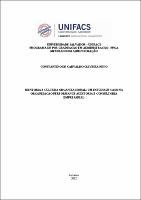| Compartilhamento |


|
Use este identificador para citar ou linkar para este item:
http://tede.unifacs.br/tede/handle/tede/83Registro completo de metadados
| Campo DC | Valor | Idioma |
|---|---|---|
| dc.creator | Oliveira Neto, Constantino de Carvalho | pt_BR |
| dc.creator.Lattes | http://buscatextual.cnpq.br/buscatextual/visualizacv.do?id=K4463094H1 | por |
| dc.contributor.advisor1 | Souza-silva, Jader Cristino de | pt_BR |
| dc.contributor.advisor1Lattes | http://buscatextual.cnpq.br/buscatextual/visualizacv.do?id=K4799343U9 | por |
| dc.contributor.referee1 | Fialho, Sérgio | pt_BR |
| dc.contributor.referee2 | Boaventura, Edivaldo Machado | pt_BR |
| dc.contributor.referee2Lattes | http://buscatextual.cnpq.br/buscatextual/visualizacv.do?id=K4788342A3 | por |
| dc.date.accessioned | 2016-04-29T13:54:31Z | - |
| dc.date.available | 2013-08-18 | pt_BR |
| dc.date.issued | 2012-12-17 | pt_BR |
| dc.identifier.citation | OLIVEIRA NETO, Constantino de Carvalho. Mentoring, ORGANIZATIONAL CULTURE: A CASE STUDY IN THE ORGANIZATION PERFORMANCE AUDIT AND CONSULTING BUSINESS. 2012. 108 f. Dissertação (Mestrado em Administração) - Universidade Salvador, Salvador, 2012. | por |
| dc.identifier.uri | http://teste.tede.unifacs.br:8080/tede/handle/tede/83 | - |
| dc.description.resumo | O conhecimento é o recurso mais importante de uma organização, porquanto a aprendizagem organizacional torna-se um processo fundamental para as empresas que desejam se manter em um mercado altamente competitivo. Assim, os programas de aprendizagem socioprática surgem como uma forma de se socializar o conhecimento, de maneira eficiente e completa. Dentre as possibilidades desses programas, destaca-se neste trabalho a mentoria: forma de aprendizagem socioprática, onde existe uma pessoa mais experiente, oferecendo ao seu aprendiz, suporte psicossocial, suporte profissional e um modelo a ser seguido. Além de traçar uma visão ampla do assunto, este trabalho faz uma revisão teórica dos diferentes tipos de mentoria, como também as suas características e seus benefícios. Partindo desse ponto, tentou-se detectar quais os valores da cultura organizacional são importantes para que a mentoria seja exitosa. Com o intuito de identificar a representação do pensamento preponderante, e, por conseguinte, os valores e crenças de uma cultura, este trabalho se utilizou do estudo de caso simples com a empresa de auditoria e consultoria Performance e da metodologia do discurso do sujeito coletivo (DSC). Como resultado, verificaram-se os diferentes tipos de mentoria que se desenvolvem na Performance, baseados na revisão dos principais trabalhos encontrados na literatura. Além disso, observou-se que sete valores culturais são dominantes entre os profissionais da organização. Dessa forma, identificaram-se três diferentes categorias de valores que são fundamentais para que os relacionamentos de mentoria sejam exitosos. | por |
| dc.description.abstract | Knowledge is the most important resource of an organization. Thereby, the organizational learning becomes an essential process for companies who wish to remain in a highly competitive market. Thus, the social-practice learning programs offer the opportunity to efficiently and completely socialize knowledge. Among the possibilities of these programs, we highlight in this work the mentoring: a form of social-practice learning whereby a more experienced person is offering his apprentice psychosocial support, professional support and a role modeling. Besides it shows a broad overview of the subject, this work makes a theoretical review of the different types of mentoring as its characteristics and benefits. From this point, it also tries to identify which organizational cultural values are important for the mentoring to be successful. In order to identify the representation of the prevalent thoughts, and consequently the culture values e believes, this work makes use of simple case study with an auditing and consulting company Performance and the methodology of the collective subject discourse (DSC). As a result, this work finds different types of mentoring that occurs inside the Performance, based on a review of major studies in the literature. Moreover, it was observed that seven cultural values are dominant among the professionals in the organization. Thus, were identified three different categories of values that are fundamental to success of the mentoring relationships. | eng |
| dc.description.provenance | Made available in DSpace on 2016-04-29T13:54:31Z (GMT). No. of bitstreams: 1 Dissertacao Mestrado CONSTANTINO DE CARVALHO.pdf: 1033967 bytes, checksum: 08b1c409195a65343b0fc192cc31f919 (MD5) Previous issue date: 2012-12-17 | eng |
| dc.description.sponsorship | Coordenação de Aperfeiçoamento de Pessoal de Nível Superior | pt_BR |
| dc.format | application/pdf | por |
| dc.thumbnail.url | http://tede.unifacs.br:8080/tede/retrieve/448/Dissertacao%20Mestrado%20CONSTANTINO%20DE%20CARVALHO.pdf.jpg | * |
| dc.language | por | por |
| dc.publisher | Universidade Salvador | por |
| dc.publisher.department | Administração | por |
| dc.publisher.country | BR | por |
| dc.publisher.initials | UNIFACS | por |
| dc.publisher.program | Programa de Pós-Graduação em Administração | por |
| dc.rights | Acesso Aberto | por |
| dc.subject | Mentoria | por |
| dc.subject | Cultura organizacional de aprendizagem | por |
| dc.subject | Aprendizagem organizacional | por |
| dc.subject | Perspectiva socioprática | por |
| dc.subject | Mentoring | eng |
| dc.subject | Organizational learning culture | eng |
| dc.subject | Organizational learning | eng |
| dc.subject | Socialpractice perspective. | eng |
| dc.subject.cnpq | CNPQ::CIENCIAS SOCIAIS APLICADAS::ADMINISTRACAO::ADMINISTRACAO DE SETORES ESPECIFICOS | por |
| dc.title | MENTORIA E CULTURA ORGANIZACIONAL: UM ESTUDO DE CASO NA ORGANIZAÇÃO PERFORMANCE AUDITORIA E CONSULTORIA EMPRESARIAL | por |
| dc.title.alternative | Mentoring, ORGANIZATIONAL CULTURE: A CASE STUDY IN THE ORGANIZATION PERFORMANCE AUDIT AND CONSULTING BUSINESS | eng |
| dc.type | Dissertação | por |
| Aparece nas coleções: | Administração | |
Arquivos associados a este item:
| Arquivo | Descrição | Tamanho | Formato | |
|---|---|---|---|---|
| Dissertacao Mestrado CONSTANTINO DE CARVALHO.pdf | 1,01 MB | Adobe PDF |  Baixar/Abrir Pré-Visualizar |
Os itens no repositório estão protegidos por copyright, com todos os direitos reservados, salvo quando é indicado o contrário.




